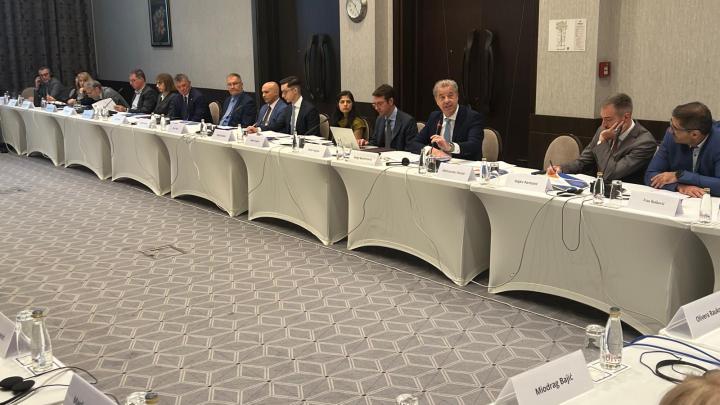Chief Prosecutor Serge Brammertz urges renewed regional cooperation in war crimes prosecution at annual Western Balkans conference

Mr. Serge Brammertz, Chief Prosecutor of the International Residual Mechanism for Criminal Tribunals (Mechanism), attended the annual conference of war crimes prosecutors from the Western Balkans region, held this year in Podgorica, Montenegro on 17 and 18 September.
Prosecutor Brammertz began by expressing his appreciation to the European Union for financing the conference, organized by UNDP, as well as supporting the joint EU-OTP project to strengthen war crimes justice in the region. The European Union has always played a significant role in the fight against impunity and promoting reconciliation.
Prosecutor Brammertz noted that this year was the 20th anniversary of the first meeting of the region’s war crimes prosecutor in Palić, Serbia. He recalled that it was then already well-understood that effective war crimes justice would depend on effective regional cooperation. The challenge has always been clear: many perpetrators now live in different countries than where they committed their crimes, and cannot be extradited back for trial. It is incumbent on prosecutors then to cooperate, exchange evidence and transfer cases so that these perpetrators can be brought to justice.
Prosecutor Brammertz reflected that many of the early hopes had unfortunately not been realized. After some initial steps forward, the situation then substantially reversed, with the result that cooperation plummeted. Government decisions and political interference have had a significant chilling effect, putting barriers in the way of effective cooperation, exposing prosecutors to influence and diminishing willingness to find solutions. As a result, cooperation between certain countries is effectively non-existent, trials in absentia continue and many perpetrators still enjoy impunity.
Nonetheless, in recent years, there have been some positive developments, particularly between Bosnia and Herzegovina and Serbia, and more recently Montenegro. Prosecutors have exchanged evidence and transferred cases, including against some senior- and mid-ranking officials. Some political authorities have taken steps to promote cooperation and reduce tensions, such as Serbia’s decision to halt the arrests on war crimes charges of citizens of Bosnia and Herzegovina entering Serbia.
Prosecutor Brammertz encouraged all participating prosecutors to make renewed efforts to significantly improve their cooperation together. In this regard, he highlighted the opportunity to address the approximately 400 unavailable war crimes suspects identified by prosecutors in Bosnia and Herzegovina, nearly all of whom currently reside in Croatia or Serbia. Bosnian prosecutors are determined to transfer these investigations to their counterparts. During his official visits in recent weeks, Prosecutor Brammertz raised this matter with senior Croatian and Serbian officials, who committed to accepting the transferred cases for further processing. Prosecutor Brammertz expressed his trust that the Croatian State Attorney’s Office and Serbian War Crimes Prosecutor’s Office would appropriately prioritize these cases, complete the necessary investigations and issue indictments where warranted.
Prosecutor Brammertz emphasized the value of these annual conferences, which allow the region’s war crimes prosecutors to provide updates on their work, share experiences, discuss solutions to identified challenges and work to strengthen national accountability for war crimes committed during the conflicts in the former Yugoslavia. The participating delegates constructively engaged on important topics, including how to improve prosecutorial cooperation in the transfer of evidentiary materials and discussed solutions to common challenges faced in conflict-related sexual violence cases.
In conclusion, Prosecutor Brammertz reminded colleagues that the victims and survivors have high expectations for further justice, and they look to the gathered prosecutors to investigate and prosecute those responsible.
Prosecutor Brammertz visited Croatia and Serbia earlier this month, held high-level meetings this week in Montenegro and will visit Bosnia and Herzegovina next week for additional discussions concerning war crimes justice in the region.
Prosecutor Brammertz will present his next report to the UNSC later this year.